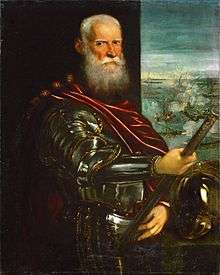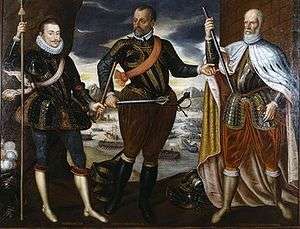Sebastiano Venier
Sebastiano Venier (or Veniero) (c. 1496 – 3 March 1578) was Doge of Venice from 11 June 1577 to 3 March 1578. He is best remembered in his role as the Venetian admiral at the Battle of Lepanto.


Biography
_-_Funeral_monument_of_the_Doge_Sebastiano_Venier_by_Antonio_dal_Zotto.jpg)

Venier was born in Venice around 1496. He was a son of Moisè Venier and Elena Donà, and a nephew of Zuan Francesco Venier, Co-Lord of Cerigo.[1] He was a paternal grandson of Moisé Venier (ca. 1412 - ca. 1476).[2] He was the great-great-great-grandson of Pietro Venier, Governor of Cerigo,[3] and wife.
He worked as a lawyer from a very early age, though without holding formal qualifications, and subsequently was an administrator for the government of the Republic of Venice. In 1570 he was procurator of St Mark's and, in the December of the same year, capitano generale da Mar of the Venetian fleet in the new war against the Ottoman Turks.
He was the commander of the Venetian contingent at Battle of Lepanto (7 October 1571), in which the Christian League decisively defeated the Turks. After the peace he returned to Venice as a very popular figure, and in 1577, at the age of 81, he was unanimously elected Doge.
He was married to Cecilia Contarini, who bore him a daughter, Elena Venier, and two sons. One of his sons, Francisco Venier, went to France.
Sebastiano Venier died in 1578, allegedly of broken heart after a fire that had heavily damaged the Doge's Palace of Venice. He was interred in the Basilica di San Giovanni e Paolo, a traditional burial place of the doges.
Relations
There is a possibility that he was a first cousin once removed of Cecilia Venier-Baffo, known as Nurbanu Sultan after her conversion to Islam, daughter of his first cousin Nicolò Venier, Lord of Paros. She was abducted during the Ottoman–Venetian War (1537–1540) and sent to the Ottoman Sultan Suleiman the Magnificent[4] in order to counter the ascension of Roxelana. She became eventually the wife of his son Selim II and the mother of Murad III, from whom descend all succeeding Sultans.[5]
| Political offices | ||
|---|---|---|
| Preceded by Alvise I Mocenigo |
Doge of Venice 1577–1578 |
Succeeded by Nicolò da Ponte |
References
- Ancestry of Sultana Nur-Banu (Cecilia Venier-Baffo)
- Mihail-Dimitri Sturdza, Dictionnaire Historique et Généalogique des Grandes Familles de Grèce, d'Albanie et de Constantinople, Paris: Sturdza, 1983, p. 446
- Mihail-Dimitri Sturdza, Dictionnaire Historique et Généalogique des Grandes Familles de Grèce, d'Albanie et de Constantinople, Paris: Sturdza, 1983, p. 445
- Ancestry of Sultana Nur-Banu (Cecilia Venier-Baffo)
- A. D. Alderson, The structure of the Ottoman dynasty, Oxford: Clarendon, 1956, Table XXXI et seq., for details.